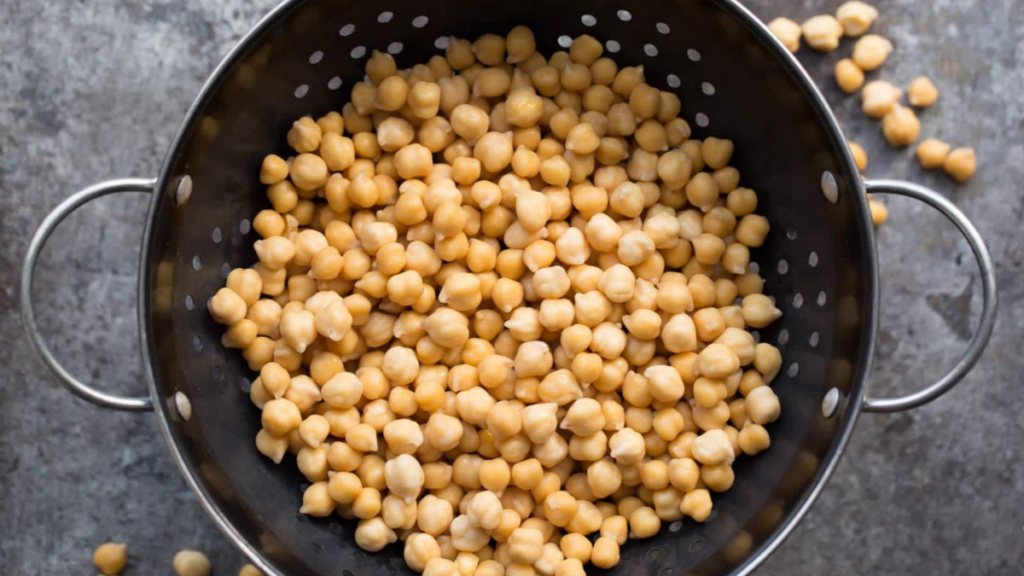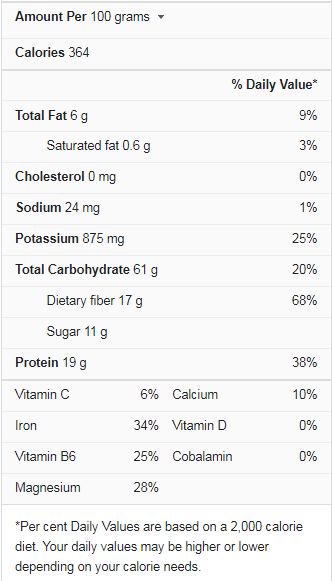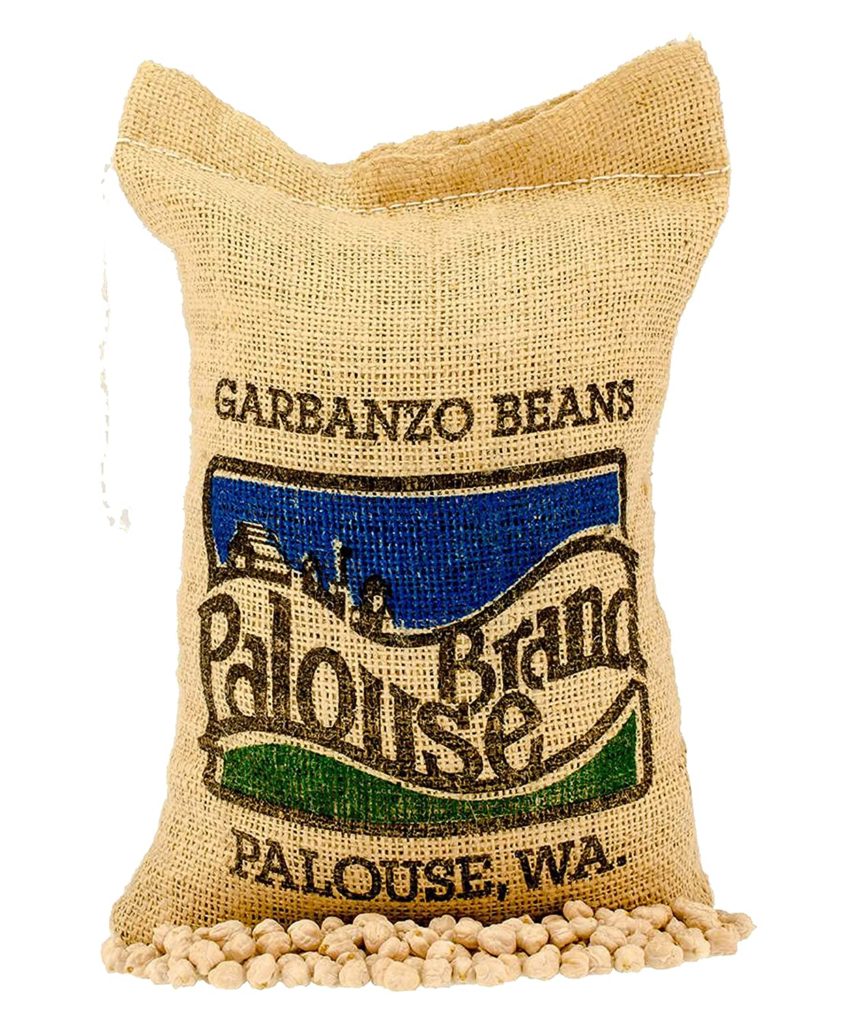Garbanzo beans, or chickpeas, have been grown and consumed in Middle Eastern countries. Their nutty flavor and gritty texture complement a variety of cuisines and seasonings. Chickpeas, high in vitamins, minerals, and fiber, may help you lose weight, improve digestion, and lower your disease risk. Furthermore, this bean is high in protein and can be used to replace meat in a variety of vegetarian and vegan meals. Here are some basic cooking ideas and evidence-based health advantages of chickpeas.
Chickpea Nutrition Facts
Chickpea Health Benefits
Chickpeas have an excellent nutritional profile. They have modest calorie content, at 269 calories per cup (164 grams). Carbohydrates account for roughly 67 percent of these calories, with protein and fat accounting for the remainder. Chickpeas also contain a good quantity of fiber and protein and a variety of vitamins and minerals. Cooked chickpeas in a 1-cup (164-gram) serving to provide
Can Chickpeas Control your Appetite?
Chickpeas’ protein and fiber content may help you control your appetite. Protein and fiber work together to promote fullness by slowing digestion. Furthermore, protein may raise your body’s levels of appetite-suppressing hormones. The filling properties of chickpeas’ protein and fiber may automatically reduce your calorie intake. In one study, 12 women ate two separate meals, and their hunger and calorie intake were compared.
They ate 1.25 cups (200 grams) of chickpeas before one of the meals, then two pieces of white bread before the other. Compared to the white bread lunch, they had a significant decrease in hunger and calorie consumption following the chickpea dinner. Another small study discovered that eating pretzels and chickpea-based hummus for an afternoon snack resulted in a 70% reduction in hunger and a 30% increase in fullness.
Are they Rich in Plant Protein?
Chickpeas are a good source of plant-based protein, making them a good choice for vegetarians and vegans. A 1-cup (164-gram) portion has roughly 14.5 grams of protein, equivalent to similar foods like black beans and lentils. Chickpea protein may aid in promoting fullness and controlling your appetite. Protein is also essential for weight loss, bone health, and muscle strength. Chickpea protein appears to be of higher quality than that of other legumes, according to several research.
Chickpeas, except for methionine, contain all of the necessary amino acids. As a result, they’re an incomplete protein source. Chickpeas should be paired with a whole grain that includes methionine, such as quinoa, to ensure that you get all the amino acids in your diet.
Can it help you Manage your Weight?
Chickpeas’ filling properties may help with weight loss. Chickpeas’ protein and fiber may suppress your appetite, lowering your calorie consumption at meals. According to one study, people who ate chickpeas regularly were 53 percent less likely to have a BMI over 30 and had a smaller waist circumference than those who didn’t.
While BMI is still a popular health metric, keep in mind its limitations. However, another study indicated that people who ate at least one serving of legumes per day, such as chickpeas, lost 25% more weight than those who didn’t. Although these findings are encouraging, further human research is required.
Do they Support Blood Sugar Regulation?
Chickpeas can help you manage your blood sugar in a variety of ways. For starters, they have a low glycemic index (GI), which measures how quickly your blood sugar rises after you eat anything. Low-GI diets have been demonstrated to help people regulate their blood sugar levels. Chickpeas’ fiber and protein may also assist in controlling blood sugar levels. Fiber inhibits glucose absorption, resulting in a gradual rise in blood sugar levels rather than a surge. Protein-rich diets may also aid in the maintenance of normal blood sugar levels.
When compared to eating two pieces of white bread, consuming 1.25 cups (200 grams) of chickpeas inhibited post-meal increases in blood sugar levels. By up to 36%, an older 12-week trial discovered that 45 persons who ate four 10.5-ounce (300-gram) cans of chickpeas per week had significantly lower fasting insulin levels, a critical element in blood sugar regulation. Furthermore, some studies link chickpea consumption to a lower risk of various ailments, including diabetes and heart disease. Their ability to reduce blood sugar levels is typically credited for these effects.
Does it Benefit Digestion?
Chickpeas are high in fiber, which has various digestive health benefits. Chickpea fiber is mainly soluble, which combines with water in the digestive tract to form a gel-like material. Soluble fiber may aid in forming beneficial bacteria in your stomach while also preventing the expansion of harmful bacteria. Some digestive illnesses, such as irritable bowel syndrome (IBS) and colon cancer, may be less likely. According to one study, chickpeas may also aid digestive health by increasing the frequency, ease, and consistency of bowel movements.
Does it Promote Brain Health?
Chickpeas may benefit brain function and mental wellness due to their outstanding nutritional profile. This is primarily because they’re high in choline, essential for brain function. This vital nutrient is required to create certain neurotransmitters, which act as chemical messengers between nerve cells in your body. While choline is essential for newborns, little is known about its role in adult health. Chickpeas are exceptionally high in magnesium, an essential mineral for nerve function. Furthermore, research suggests that numerous minerals included in these legumes, including magnesium, selenium, and zinc, may aid in the prevention of sadness and anxiety.
It May Helps Prevent Iron Deficiency
Chickpeas are a good source of iron, with 1 cup providing around 26% of the daily requirement (164 grams). Red blood cell synthesis, physical growth, cognitive development, muscle metabolism, and other aspects of health all require iron. Your body’s ability to make healthy red blood cells may be harmed if you don’t get enough of this critical vitamin.
As a result, iron deficiency, a disorder marked by weakness, exhaustion, and shortness of breath, may develop. Chickpeas are, therefore, an excellent choice for persons who are at risk of iron deficiency, such as vegans and vegetarians. Chickpeas also contain vitamin C, which may aid iron absorption in the body.
Can Chickpeas Help you Lose Weight?
Chickpeas are excellent for weight loss because they are high in fiber, which keeps you feeling fuller for longer. Chickpeas are high in protein and fiber, which help you lose weight. Protein satisfies the appetite, while fiber keeps you filled for longer. Its fiber content is also beneficial to your digestive system. Chickpeas’ high fiber and protein content promotes weight loss by increasing satiety levels. According to a weight-loss study, persons who ate chickpeas regularly were 53 percent more likely to have a lower BMI. According to a new study, eating one serving of beans and peas.
Chickpeas or lentils per day can considerably lower “bad cholesterol” and hence the risk of cardiovascular disease. On average, North Americans consume less than half a serving each day. Daily absorption of Vitamin B6 from dietary sources like chickpeas can help promote a sound and uninterrupted sleep cycle6, which is more than enough reason to try snack items that contain this high protein, B6-rich legumes the next time you’re craving a late-night snack.
How Many Cups of Chickpeas should you Consume Each Day?
Chickpeas can cause gas, but not as much as other legumes. A low FODMAP diet allows up to 1/4 cup of chickpeas daily for digestive troubles. Allow your body to acclimatize by gradually adding chickpeas and other legumes to your diet. You will be able to tolerate them better over time. About 269 calories per serving (about one cup). Approximately 4 grams of fat Carbohydrates range from 34 to 45 grams (canned chickpeas are on the lower end). Furthermore, the legume is heavy in fiber, which is indigestible.
Carbohydrate produces bloating and gas when consumed in large amounts. You may not suffer any of these symptoms if you limit yourself to around 1/4 cup of chickpeas each serving and rinse them before eating them. Chickpeas also contain a good quantity of fiber and protein and a variety of vitamins and minerals. Cooked chickpeas in a 1-cup (164-gram) serving to provide.
Is it Necessary to Remove the Skin from Chickpeas?
Chickpeas can be eaten with the skin on, although they taste better without it. When cooking hummus, removing the skins will result in a much creamier and richer hummus. When roasting chickpeas, I find that removing the skins enhances the flavor of the chickpeas. How to Peel a Chickpea Chickpeas, also known as garbanzo beans, have fragile skin on the outside. Chickpeas can be eaten with the skin on, although they taste better without it.
When cooking hummus, removing the skins will result in a much creamier and richer hummus. If one bean irritates you, switch to another to see if it produces less gas. Other pulses, such as lentils, split peas, and black-eyed peas, are lower in gas-producing carbs. Chickpeas and navy beans are at the top of the food chain. Chew carefully.
Conclusion
Chickpeas are incredibly easy to add to your diet, and they’re affordable and widely available in both canned and dry varieties. Due to their high protein content, they’re an excellent substitute for meat on vegetarian and vegan diets. Plus, chickpeas are versatile and can be added to various dishes, such as salads, soups, or sandwiches. They’re also the main ingredient in hummus, a dip made from mashed chickpeas, tahini, olive oil, lemon juice, salt, and garlic. Finally, you can roast chickpeas for a delicious and crunchy snack or incorporate them into veggie burgers and tacos.




